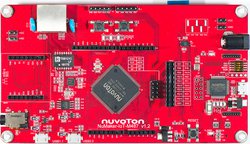Generic Pelion Device Management example for various Nuvoton-based boards.
DEPRECATED
This example application is not maintained and not recommended. It uses an old version of Mbed OS, Pelion DM, and Arm toolchain. It doesn't work with Mbed Studio.
Please use: https://os.mbed.com/teams/mbed-os-examples/code/mbed-os-example-pelion/
This example is known to work great on the following platforms:
- NUMAKER-IOT-M487 over WiFi and using build-in SD
- NUMAKER-PFM-M487 over Ethernet and using build-in SD
- NUMAKER-PFM-NUC472 over Ethernet and using build-in SD
Follow the Quick-Start instructions: https://cloud.mbed.com/quick-start



Example functionality
This example showcases the following device functionality:
- On timer button increment, simulate Pelion LWM2M button resource change
Use this example with Mbed CLI
1. Import the application into your desktop:
mbed import https://os.mbed.com/teams/Nuvoton/code/pelion-example-common cd pelion-example-common
2. Install the CLOUD_SDK_API_KEY
mbed config -G CLOUD_SDK_API_KEY <PELION_DM_API_KEY>
For instructions on how to generate your API key, please see the documentation.
3. Initialize firmware credentials (done once per repository). You can use the following command:
mbed dm init -d "<your company name in Pelion DM>" --model-name "<product model identifier>" -q --force
If above command do not work for your Mbed CLI, please consider upgrading Mbed CLI to version 1.8.x or above.
4. Compile and program:
mbed compile -t <toolchain> -m <TARGET_BOARD>
(supported toolchains : GCC_ARM / ARM / IAR)
5. Copy the binary file pelion-example-common.bin to your mbed device.
Note
This platform and application is suitable for evaluation and initial development. For production purposes, we recommend to use a different variant with built-in security features
Revisions of bootloader/bootloader_app.json
| Revision | Date | Message | Actions |
|---|---|---|---|
| 0:e0138281f21d | 2018-12-18 | Initial commit | File Diff Annotate |